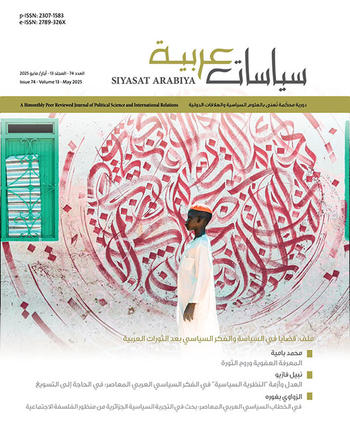Neue Publikationen von Dr. Emad Alali in "Siyasat Arabiya" (Ausg. 74/2025) (AR)
News vom 14.11.2025
Abstract
In response to the events, developments, and challenges facing Arab societies, contemporary Arab political thought continues to debate enduring political issues such as authoritarianism, democracy, Islamism, secularism, nationalism, and others. Although fundamental questions, such as those concerning the state, governance policies, and the parameters of the ruler-ruled relationship, have often been discussed within related themes and concepts like modernity, democracy, Islamic state theory, or revolution, these issues have gained significant renewed attention since the Arab Spring. They are now being revisited through critical reviews and explored via new epistemological and research perspectives. In this light, and in view of current developments in the Arab region, this issue seeks to pose a question regarding the extent to which the propositions of modern and contemporary Arab political thought can exert influence, the priorities they express, and the implications they highlight.
- DOI: https://doi.org/10.31430/XERQ6757 (full article available in Arabic only)
Abstract
The debate continues over the "Arab Spring" revolutions and the evaluation of their results continues, especially within the framework of the "success-failure" dichotomy, based on sociological analysis tools that generally emphasize their shortcomings. This study argues that these revolutions have reformist goals with value-oriented and normative contents touching on the core of the political question, which are no less important than material goals such as regime overthrow. Attempting to provide an alternative interpretation of the Arab situation through a different epistemological approach, this study aims to demonstrate the non-material political content of the Arab revolutions by incorporating normative and sociological ideas and conceptions into a new conceptual and methodological approach. Accordingly, the study adresses the political dimensions of revolutionary demands: the decisive rejection of authoritarianism and affirmation of political rights. While attempting to refute the assessment of the Arab revolutions as a failure to achieve democratic transition, it posits that the non-material revolutionary purpose is to highlight a "return to politics" as a basis for future political and democratic change. This is a call to rethink all aspects of Arab politics and to establish new foundations for a contractual relationship between the state and society that meets the conditions of the time.
DOI: https://doi.org/10.31430/DLRF8678 (full article available in Arabic only)



